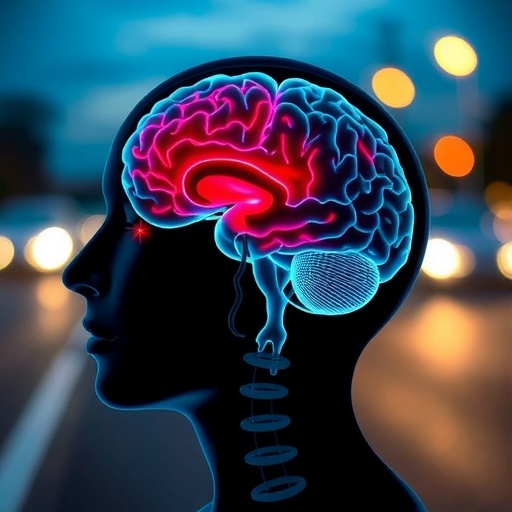In a groundbreaking study published in the November 2025 issue of BMJ Open, researchers from the Institute for Clinical Evaluative Sciences (ICES) and Sunnybrook Research Institute have unveiled a concerning association between concussion diagnosis and an elevated risk of subsequent traffic crashes among adults. This comprehensive retrospective cohort analysis, conducted in Ontario, Canada, casts new light on the often underappreciated long-term impacts of concussions on everyday activities such as driving, underscoring the critical need for enhanced post-concussion care and public safety interventions.
Concussions, a subset of mild traumatic brain injuries, are known to induce a cascade of neurological symptoms that can persist well beyond the initial injury phase. Symptoms such as insomnia, dizziness, depression, cognitive fog, and delayed reaction times are not only debilitating but also insidiously influence one’s ability to engage in complex tasks requiring sustained attention and rapid decision-making. The study’s leading author, Dr. Donald Redelmeier, emphasizes the subtle yet significant ways these impairments can compromise driving performance and substantially increase the likelihood of motor vehicle collisions.
Utilizing a large-scale observational framework, the research team analyzed data from 425,158 adults diagnosed with concussion over a defined period. Their findings reveal a striking 50 percent increase in the risk of experiencing a subsequent traffic crash compared to individuals without concussion diagnoses. Particularly alarming is the concentration of risk within the initial four weeks following the concussion event, suggesting a critical window where neurological recovery is incomplete and functional deficits remain pronounced.
Notably, this elevated risk is compounded in individuals who have sustained multiple concussions, reinforcing the cumulative impact of recurrent brain injuries on neurocognitive function and psychomotor skills. The heightened vulnerability was observed not only among motor vehicle operators but extended to pedestrians navigating urban environments, indicating a broader spectrum of mobility-related hazards post-concussion.
The public health implications of these findings are profound. Beyond the immediate human toll, the study quantified the societal burden in terms of healthcare utilization and economic cost. The increased incidence of traffic crashes linked to concussions accounted for a staggering 1,633 ambulance calls and 59,978 days of hospital admission. Financially, this corresponds to approximately $835 million in medical costs, illuminating the often overlooked downstream economic impact of concussions on the healthcare system.
While the study’s observational design precludes definitive causal inferences, the robust association aligns with established physiological mechanisms delineating the neuropathological sequelae of mild brain trauma. Impaired executive functioning, slowed information processing speed, and compromised spatial awareness collectively degrade the cognitive underpinnings essential for safe driving.
The researchers acknowledge certain limitations, including the absence of granular data on concussion severity and the influence of confounding variables such as pre-existing conditions or behavioral risk factors that may predispose individuals both to concussions and subsequent traffic incidents. Nevertheless, the findings reinforce a growing consensus that concussion management must extend beyond symptom resolution to encompass comprehensive risk mitigation strategies tailored to activities like driving.
In light of these insights, clinicians are urged to implement rigorous patient education protocols emphasizing traffic safety, particularly in the vulnerable recovery phase. Recommendations include vigilant treatment of insomnia and psychological symptoms, cautious avoidance of nocturnal or high-speed excursions, and enhanced surveillance for recurrent injury risk.
Robert Tibshirani, a co-author and statistician at Stanford University, highlights the interplay between clinical observation and statistical rigor in elucidating these risk dynamics, advocating for interdisciplinary collaboration in advancing concussion research and policy-making.
The study’s revelations underscore an urgent need for public health campaigns and legislative frameworks that acknowledge and address the latent risks concussions pose for road safety. Integrating neurological assessment into standard fitness-to-drive evaluations may emerge as a pivotal safeguard in preventing avoidable accidents.
As research continues to unravel the complexities of concussion pathology, this study acts as a clarion call for a paradigm shift in how healthcare providers, patients, and societies conceptualize concussion recovery—not as a fleeting injury but as a condition with far-reaching consequences demanding diligent management.
In sum, this landmark investigation contributes critical empirical evidence to the discourse on neurological injury and public safety, fostering a nuanced understanding that could shape future clinical guidelines, rehabilitation protocols, and traffic safety policies worldwide.
Subject of Research: People
Article Title: Concussions and risk of a subsequent traffic crash: retrospective cohort analysis in Ontario, Canada
News Publication Date: 6-Nov-2025
Web References: http://dx.doi.org/10.1136/bmjopen-2025-105391
Keywords: Health care costs, Emergency medicine




